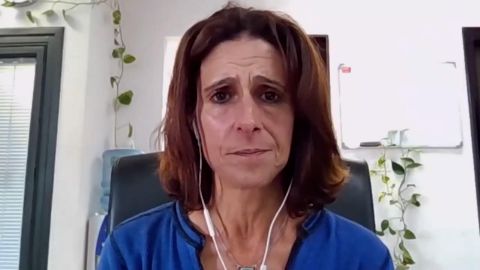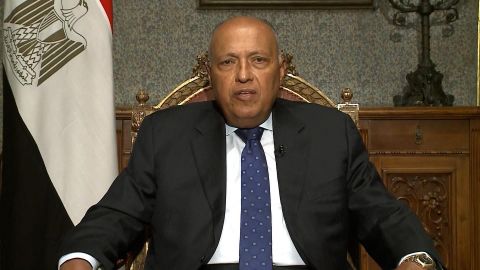Read Transcript EXPAND
CHRISTIANE AMANPOUR, HOST: Sameh Shoukry, welcome to the program. Can I start by asking you, what is the problem at the Rafah Crossing? Why is aid not coming into Gaza for people?
SAMEH SHOUKRY, EGYPTIAN FOREIGN MINISTER: Well, currently, there’s a long – – miles long convoy of humanitarian assistance between Arish and Rafah with trucks on the side of the road awaiting the possibility of entering Reza (ph). The Rafah Crossing over the last days has been bombed four times. Among them once when we were trying to repair some of the damage, four Egyptian workers were injured. The crossing has sustained damage, the roads — access roads between the Egyptian and the Gaza side have severe damage and need repair. And thereby, we do not have as well any authorization and clear secure routes for those convoys to be able to enter safely and without any possibility of their being targeted. That is the current status and situation. And we are working diligently, hoping that there is an opening and an ability to repair the crossing so that the convoys can go in. There is a great need on the part of those that have been displaced from the north of Gaza who are now on conditions of lack of food, water, shelter. And they are suffering immensely. But until now, there is no safe passage that’s been granted and the — no ability to repair the damage that has been inflicted on the crossing.
AMANPOUR: OK. So, we have seen — CNN has been reporting that, indeed, there have been airstrikes around Rafah and we have shown it on our air today. Plumes of smoke around that area. My question to you though is, even if it was open and that you brought — allowed humanitarian convoys in, who are you willing to allow out? Because clearly, there’s a massive pressure. Palestinians are trying to flee. Would you accept tens, hundreds of thousands of desperate Palestinians into Egypt?
SHOUKRY: I see that this is a repeated question posed to us. And I wonder whether it shouldn’t be the case that what should be allowed is the entrance of humanitarian assistance to provide for the Gazan peoples to remain on their territory. That transfer, that displacement is in contravention to international humanitarian law. I don’t understand in what is the purpose of the transfer, except if it is intentional, of vast numbers of people to a country that is already host to 9 million refugees to have an additional influx of this nature. I believe that many European countries are very sensitive to this issue and do everything possible to avoid it. I know the United States has a problem on its southern border that it restricts the entry of those who seek it. So, I wonder why Egypt should be presumed, would allow for the influx of 1 million or 2 million inhabitants who are suffering because of the consequences of their being targeted unnecessarily.
AMANPOUR: I just want to know whether it’s also an issue of worry that they would never be allowed back. For instance, the Jordanians have said any attempt to move Palestinians out of the occupied West Bank is a red line for them. And I’m wondering if you are concerned, like other Arab leaders are, and certainly Palestinians, that if even you did allow them in, that would be the end of their ability to go back into Gaza.
SHOUKRY: Well, that is certainly a possibility. And there might be an intention that they are forcibly thereby displaced and that they lose their property and they lose their homeland for purposes of a political reason. And that is absolutely a violation. If it doesn’t constitute a war crime in itself, the displacement, the forcible displacement of a population of that size is unjustified and unwarranted.
AMANPOUR: Your president, President Sisi, will be meeting — along with the king of Jordan and Mahmoud Abbas, the head — the president of the Palestinian Authority, will be meeting with President Biden in Amman. What do you think this conversation is aimed at? What are we looking at immediately and in the long-term?
SHOUKRY: Well, in the immediate term, I believe the conversation would have to emphasize the importance of protecting civilian lives, the necessity to provide humanitarian access, to provide safe havens for civilians so that they are provided their rights under international and humanitarian law. But also, it necessarily would have to deal with the prospects of re- initiation of a political pathway and a political horizon for the establishment and the end of the conflict of a two-state solution.
About This Episode EXPAND
Egyptian foreign minister Sameh Shoukry on Biden’s upcoming visit to Israel. Sharone Lifschitz joins the show after both her parents were kidnapped from their kibbutz. Radek Sikorski discusses the success of his pro-EU party in Polish elections on Sunday. Human Rights Watch Program Director Sari Bashi discusses the increasingly grave situation on the ground in Gaza and the occupied West Bank.
LEARN MORE

